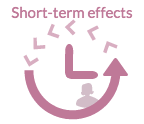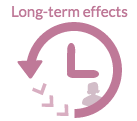What are the mental health effects of FGM/C?
Female genital mutilation/cutting (FGM/C) can affect a woman's mental health long after the procedure, into her adult life. Women with FGM/C often show signs of psychological trauma: anxiety, somatization, depression, post-traumatic stress and other mood disorders.1 There are few studies that examine how FGM/C can affect a child's mental health. One study found that young girls who experienced physical health effects after the cutting, whether short term (bleeding) or long term (urinary issues), were more likely to feel depressed.2 Another study showed that adolescent girls who had undergone FGM/C were more likely to have depression, anxiety, phobias and hostility towards others.3 More studies are needed to fully understand what the effects are on young girls.1 We don't know how age of cutting/mutilation, severity of FGM/C, and presence of chronic health issues may affect the mental health of children and adolescents.


"Among women who have had FGM/C done, we see a high rate of women who have been sexually attacked, have increased mental and physical trauma, a lot of domestic violence and PTSD, are coming from war torn area, these men and women have experienced so many other traumas." - Health care provider
Trauma stems from both the mutilation/cutting itself as well as having to recount the experience to others. When doctors react with shock or disgust when discovering a woman's FGM/C, women can feel afraid, embarrassed, and stressed. As a consequence, women may simply no longer be willing to discuss their FGM/C with their doctor.*
Women who have undergone genital mutilation may also experience:
Isolation
Women report that they are unable to discuss their FGM/C with friends, doctors or partners because of the stigma surrounding the practice. Women also said they are “missing out” on important experiences, particularly in intimate relationships. This comes out when friends share their own positive sexual experiences.*
Frustration and confusion
Women may not necessarily know how FGM/C affects their physical health. Having undergone genital cutting at a young age, women said they did not know what was “normal” in the context of their health. They may not know that the several negative physical symptoms they are experiencing are a result of cutting. Women who are aware of how FGM/C affected their health report feeling a sense of resignation. They feel there is nothing they can do to improve their symptoms.9
Anger
Women who have undergone FGM/C also report feelings of anger, particularly at family members who have violated their trust.4,10
"FGM is not just about something physical that has happened, it is very emotional and can impact an individual's ability to form a relationship with somebody" - Health care provider
In their own words:
A survivor of FGM/C relives her experience being cut when she has a flashback in an examination room:
What happens when survivors realize that not everyone has been cut?
Women and girls with FGM/C may not even know that their vagina looks different than anyone else’s, or that their cutting is “abnormal.” The sudden realization that their condition is actually harmful genital mutilation/cutting – rather than the way all women are – comes as a relief to some and a shock to others. When health care providers react with disgust to seeing FGM/C in a patient, this moment of self-discovery can stir feelings of shame and stigma. Of course, not all women realize they have FGM/C in a clinic. For some, this turning point in their lives comes when listening to a classroom lecture, watching a documentary about FGM/C, or hearing family members tell stories about cutting.*
*George Washington University Milken Institute School of Public Health original study, 2018-19.
“The client’s trauma was actually about going to the gynecologist. The client was concerned about 'seeing the horror and disgust on the physician’s face.' The physician called in the nurses and many people were looking at her genitals during her exam. The client reported that she was more traumatized by 'the reactions on all the peoples’ faces . . . than the actual cutting." - Health care provider

